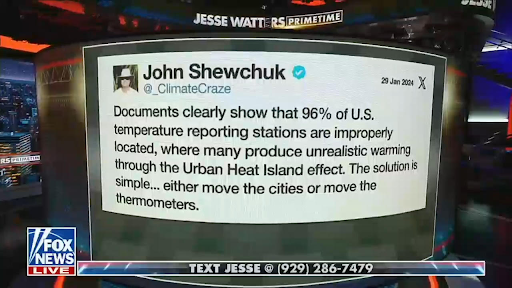Fox News’ Jesse Watters cites debunked claim to argue that climate scientists fabricated US temperature data
Written by Helena Hind
Published
On January 31, Fox News host and serial climate denier Jesse Watters pushed debunked misinformation to argue that climate scientists are “cooking the books.”
In an effort to disprove that 2023 was the hottest year on record, Watters repeated a bogus claim that the National Oceanic and Atmospheric Administration’s placement of thermometers on urban concrete skewed temperature data.
“Concrete and asphalt attract heat and retain heat a lot more than the countryside,” Watters said. “No wonder we think the earth’s warming. We’re literally cooking the books."
Citation From the January 31, 2024, edition of Fox News' Jesse Watters Primetime
Watters then cited a post from X user @_ClimateCraze claiming that “improperly located” thermometers “produce unrealistic warming through the Urban Heat Island effect.” Conveniently, Fox News cropped out a portion of the post — a link to a debunked “study” from junk science blogger and climate denier Anthony Watts. The 2022 report, produced by fossil fuel-funded think tank the Heartland Institute, falsely claims that 96% of U.S. climate data is “corrupted” due to thermometer placement

Multiple news outlets and fact-checkers have disproved the Heartland Institute’s bogus study as it spread across social media, with Agence France-Presse noting that past claims about biased data from urban temperature monitoring sites have been “thoroughly refuted.”
PolitiFact pointed out that Heartland’s false claim that the data is corrupted “ignores key facts” including:
First, climate scientists know that weather station data can be impacted by poor siting, and they adjust data accordingly.
Second, climate change analysis focuses on changes over time.
Further, PolitiFact noted that the scientific community has rejected this claim:
"The correct approach is to write a scientific paper and submit it to a scientific journal," said Zeke Hausfather, a climate scientist currently serving as research lead at Stripe, a San Francisco-based technology company. "In this specific case, the author of the report, Anthony Watts, submitted a paper on the topic around 10 years ago, but was unable to successfully convince other scientists of the validity of his findings and to pass the peer review process."